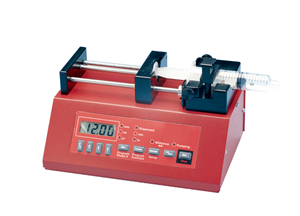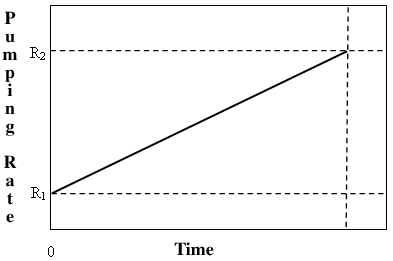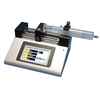

AL-1002X
Aladdin SyringeONE Microfluidics Programmable Syringe Pump
- Overview
- Specifications
- Accessories
- Citations
- Related Products
Overview

There are 1 images available to view - click to enlarge and scroll through the product gallery.
Al-1002X Aladdin Pump Instruction Manual
/ Download as PDF
-
Very precise, with reproducible flow of ±0.2%
-
Smooth pumping at ultra low flow rates - advance per step: 4.252232 Nanometers
-
Advanced smooth linerar/gradient pumping functions
-
Selectable infusion/withdrawal rate units (mL/hr, µL/hr, mL/min, µL/min)
-
Infusion rate can be changed while pumping
- Includes the X Upgrade Smooth Linear/Gradient increasing and decreasing pumping feature
- Holds 1 syringe up to 60 ml
-
Program pump via keypad or from a computer
-
Highly controllable – program sequences without a computer (holds up to 41 programming phases)
-
Network, control, and monitor up to 100 pumps with one computer
-
Hands-free operation with optional foot switch ADPT2
-
Motor stall detection
- Available in Double Syringe (AL-4002X) version
- Disposable, Glass, Stainless Steel Syringes and Plumbing Supplies are sold separately
| Channels | 1 |
| Type | Infusion / Withdrawal |
| Flow Range | 0.008 nL/hr (0.5 µL syringe) to 2545 µL/min (140 mL syringe) |
| Dispensing Accuracy | ±0.5% |
| Syringe Sizes Accepted | 0.5 µL to 60 mL or 140 mL partially filled |
| Linear Force | 150 lb at low speed; 18 lb at maximum speed |
To meet the demands of a busy lab Aladdin Pumps offer exceptional value providing versatility and reliability for accurately dispensing media down into the nanoliter range.
The Aladdin AL-1002X is a programmable single channel infusion / withdrawal syringe pump for applications demanding smooth, highly reproducable nano and pico liter flow rates. It's metal casing provides stability, ensuring less vibration is transferred to the syringes. Setup is easy using the pumps keypad or via a computer with optional PC to pump cable (GN-PC7 or GN-PC25).
The Aladdin AL-1002X can run complex programs with up to 41 pumping phases can be set to change pumping rates; set dispensing volumes; insert pauses; control and respond to external signals; sound the buzzer. It includes Linear/Gradient programs enabling the setting of the start pumping rate, end pumping rate and the time.

Example flow rates
| Syringe Size | Maximum Rate | Minimum Rate |
| 0.5 µL | 18.70 nL/min | 0.008 nL/hr |
| 1 µL | 37.57 nL/min | 0.015 nL/hr |
| 2 µL | 74.81 nL/min | 0.029 nL/hr |
| 5 µL | 187.3 nL/minr | 0.071 nL/hr |
| 10 mL | 445.6 µL/min | 167 nL/hr |
| 20 mL | 708.7 µL/min | 265.5 nL/hr |
| 30 mL | 924.5 µL/min | 346.4 nL/hr |
| 60 mL | 1503 µL/min | 563.2 nL/hr |
Dual pumping action
Need a pump for two syringes? Two Aladdin pumps when daisy-chained are more efficient and affordable than any competitor's dual syringe models. Two Aladdins (AL-2000) will perform as a dual infusion/withdrawal pump, a double pump for infusing at different rates, a push/pull pump with one infusing and one withdrawing at the same or different rates, two independent pumps, or a master/slave pump. One Aladdin can even control the second for continuous pumping with optional check valve set. The Aladdin pump series will accept syringes from Becton Dickinson, Monoject, Terumo, and Air-Tite.
Specifications
| SYRINGE SIZES | up to 60 mL (or 140 mL partially filled) |
| NUMBER OF SYRINGES | 1 |
| MOTOR TYPE | Step Motor |
| STEPS PER REVOLUTIONS | 400 |
| STEPPING (max. min.) | 4.25223214 nm to 34.0178571 nm depending on motor speed |
| MOTOR TO DRIVE SCREW RATIO | 15/28 |
| SPEED(max./min.) | 8.40896E-05 cm/hr / 0.224469144 cm/min |
| PUMPING RATES | 1699 mL/hr with 60mL syringe, to 0.73µL/hr with 1mL syringe |
| MAXIMUM FORCE | 150 lb at min. speed, 18 lb at max. speed |
| NUMBER OF PROGRAM PHASES | 41 |
| RS-232 PUMP NETWORK | 100 pumps maximum |
| POWER SUPPLY | Wall adapter 12V DC @ 1000mA |
| DIMENSIONS | 22.9 x 14.6 x 11.4 cm (8.75 x 5.75 x 4.5 in.) |
| WEIGHT | 1.7 kg (3.8 lb) |
Accessories
Citations
Birngruber, T., & Ghosh, A. (2013). Cerebral open flow microperfusion: A new in vivo technique for continuous measurement of substance transport across the intact blood–brain barrier. Clinical and …. Retrieved from https://onlinelibrary.wiley.com/doi/10.1111/1440-1681.12174/full
Ferreira, D., Reis, R., & Azevedo, H. (2013). Peptide-based microcapsules obtained by self-assembly and microfluidics as controlled environments for cell culture. Soft Matter. Retrieved from https://pubs.rsc.org/EN/content/articlehtml/2013/sm/c3sm51189h
Herricks, T., Avril, M., Janes, J., Smith, J., & Rathod, P. (2013). Clonal Variants of Plasmodium falciparum Exhibit a Narrow Range of Rolling Velocities to Host Receptor CD36 under Dynamic Flow Conditions. Eukaryotic cell. Retrieved from https://ec.asm.org/content/12/11/1490.short
Maya, H., Vincent, M., & Nötzli, S. (2013). Increased porosity of electrospun hybrid scaffolds improved bladder tissue regeneration. … Research Part A. Retrieved from https://onlinelibrary.wiley.com/doi/10.1002/jbm.a.34889/full
Tõnurist, K., Thomberg, T., & Jänes, A. (2013). Polymorphic Behavior and Morphology of Electrospun Poly (Vinylidene Fluoride) Separator Materials for Non-Aqueous Electrolyte Based Electric Double Layer. ECS …. Retrieved from https://ecst.ecsdl.org/content/50/45/49.short
Tõnurist, K., Thomberg, T., Jänes, A., & Lust, E. (2013). Specific Performance of Electrical Double–Layer Capacitors Based on Different Separator Materials and Non–Aqueous Electrolytes. ECS Transactions. Retrieved from https://ecst.ecsdl.org/content/50/43/181.short
Zander, N., & Orlicki, J. (2013). Electrospun polycaprolactone scaffolds with tailored porosity using two approaches for enhanced cellular infiltration. Journal of Materials …. Retrieved from https://link.springer.com/article/10.1007/s10856-012-4771-7
Zhang, J., Jiang, D., & Peng, H. (2014). A pressurized filtration technique for fabricating carbon nanotube buckypaper: Structure, mechanical and conductive properties. Microporous and Mesoporous Materials. Retrieved from https://www.sciencedirect.com/science/article/pii/S1387181113005192
Zhang, J., Jiang, D., Peng, H., & Qin, F. (2013). Enhanced mechanical and electrical properties of carbon nanotube buckypaper by in situ cross-linking. Carbon. Retrieved from https://www.sciencedirect.com/science/article/pii/S000862231300568X










Request
Catalogue
Chat
Print